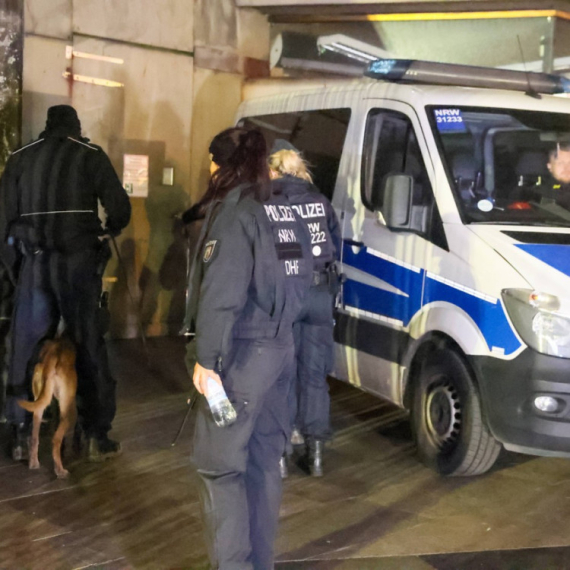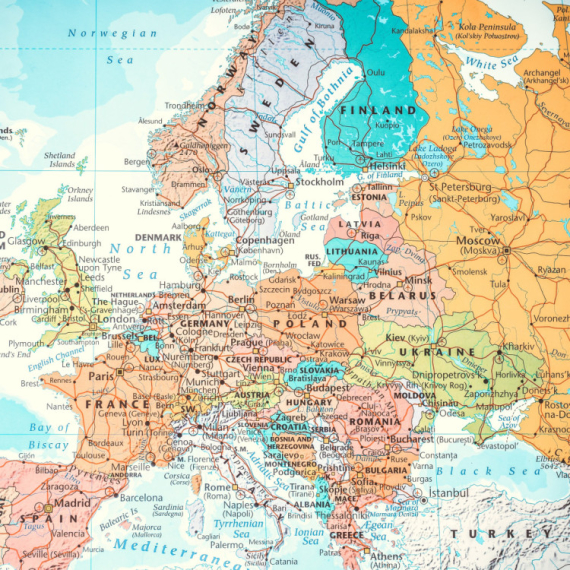FM attends OSCE meeting in Vienna
Serbian Foreign Minister Vuk Jeremić today taking part in the meeting of the Permanent Council of the OSCE in Vienna, Austria.
Monday, 21.06.2010.
11:08

Serbian Foreign Minister Vuk Jeremic today taking part in the meeting of the Permanent Council of the OSCE in Vienna, Austria. Jeremic expressed his expectation that, after the International Court of Justice (ICJ) gives its advisory opinion on Kosovo's unilateral declaration of independence, the UN General Assembly will invite the parties to arrive at consensual solutions to all outstanding issues peacefully, through dialogue. FM attends OSCE meeting in Vienna Addressing the OSCE Permanent Council, Jeremic said that Serbia responded to UDI with maximal restraint, in a way wholly unknown to the Balkan experience, without the use of unilateral counter-measures and requesting the opinion of the ICJ. "The ICJ will be reporting back to the UN in the near future. We do not expect the ensuing debate in the General Assembly to be particularly divisive. The only logical outcome would be to invite the parties to arrive at consensual solutions to all outstanding issues peacefully, through dialogue instead of unilateralism," Jeremic said. He underscored Serbia's position that UDI is an outcome that no Serbian democratic leadership will ever be ready to accommodate - implicitly or explicitly, adding that no other country would act differently if it found itself in Serbia's situation. Speaking about what Serbia wants, Jeremic said Serbia seeks a result that all parties can embrace. "This is the only way to produce a viable, sustainable, and lasting peace - and the only way to help secure regional gains, reinforce shared strategic priorities, and complete the European transformation of the Balkans," he pointed out. "We intend to be constructive and bold in conducting the dialogue that I am persuaded will shortly follow, because our sole aim is to achieve a compromise solution - acceptable to everyone - on all outstanding issues," Jeremic said. He stressed that these include a number of practical matters, from the rule of law, to guaranteeing lasting international protection for Serbian holy sites, but also topics such as healthcare, education, telecommunications, electricity, as well as privatization of socially-owned enterprises, private property restitution and the return of more than 200,000 Kosovo Serb and Roma IDPs. These are all truly important subjects, and Serbia will re-double its efforts to engage with all responsible stakeholders on finding pragmatic arrangements that would benefit all the residents of the territory, Jeremic said, adding that at the heart of all these difficulties lies a disagreement on the unilateral attempt at declaring sovereignty. Jeremic underscored that the accumulated evidence of progress in the Balkans is conclusive, adding that regional cooperation has never stood on more solid ground than it does today, even on the most challenging issues such as Kosovo andMetohija. Nevertheless, it is clear that the overall regional environment has become more complicated as a result the unilateral declaration of independence by the ethnic-Albanian authorities of the Serbian southern province of Kosovo and Metohija, Jeremic said. Jeremic pointed out that the EU membership is the central strategic priority of Serbia, adding that the most pro-European administration in Serbia's history has managed to produce significant results under very difficult circumstances. "Despite obvious signs of the so-called 'enlargement fatigue,' we remain deeply committed to the EU accession process," he said. Jeremic stressed that what is absolutely vital to sustain the positive momentum is for Serbia's EU membership application to be sent to the European Commission for consideration in the very near future. "Rational proposals" “Relations in the region have drastically improved and Serbia has excellent relation with everyone in the region. There is only one serious, open and unsolved question, and that is the issue of the future status of Kosovo,” Jeremic told media in Belgrade ahead of his trip to Vienna. Jeremic said that if Serbia has good relations with everyone in the region, and that if Kosovo is the only problem, “then it is obvious that Serbia is not the problem, but that the problem is with the temporary (Kosovo Albanian) institutions in Kosovo.” The minster said that Serbia expects “great pressure from a significant number of countries“ that would want to see Belgrade change its policy towards Kosovo after the decision of the International Court of Justice on the unilateral declaration of independence. “Serbia is prepared, we have a clearly defined policy. There will be no letting up, no retreat, no policy change,” Jeremic said, adding that Belgrade was also “ready for rational conversation with anyone, and to take any rational proposals into consideration”. Feith on “red lines” The head of the International Civilian Office, and European Union special representative in Kosovo, Pieter Feith, said that the question of Kosovo’s status “will not be opened for discussions again”, and that partitioning of the province was “not an option”. He said that the “advisory opinion of the International Court of Justice will enable constructive dialogue between Belgrade and Pristina”. “I cannot speculate on the decision of the international court, but as the international civilian representative, I can speak in the name of the countries that recognized Kosovo, and I must stress that opening the question of Kosovo’s status will not be possible, and that further dialogue should not have the goal of dividing Kosovo,” Feith said. “There are certain red lines that should be kept in mind. There is a series of practical issues of immediate importance to the citizens both in Serbia and in Kosovo that could be usefully explored. I think a start should be made from there and thus create trust between Belgrade and Pristina. That would be a useful start,” said he. Apparently referring to Serbia's state structures, Feith said he believed that the existence of “parallel institutions” in Kosovo was “unsustainable”. “If we want to move toward EU members, I think that the existence of parallel institutions in Kosovo is unsustainable. EU member-states do not have parallel institutions on the territories of their neighbors. This is impossible, because administering in that way is not transparent and it decreases the functionality of the country.” “In order to have a more serious approach to the stabilization and association of Serbia and Kosovo, then we must solve the problems of the parallel institutions. These institutions represent an obstacle in the arrival to the final destination, and that is Brussels,” the Dutch diplomat was quoted as saying.
FM attends OSCE meeting in Vienna
Addressing the OSCE Permanent Council, Jeremić said that Serbia responded to UDI with maximal restraint, in a way wholly unknown to the Balkan experience, without the use of unilateral counter-measures and requesting the opinion of the ICJ."The ICJ will be reporting back to the UN in the near future. We do not expect the ensuing debate in the General Assembly to be particularly divisive. The only logical outcome would be to invite the parties to arrive at consensual solutions to all outstanding issues peacefully, through dialogue instead of unilateralism," Jeremić said.
He underscored Serbia's position that UDI is an outcome that no Serbian democratic leadership will ever be ready to accommodate - implicitly or explicitly, adding that no other country would act differently if it found itself in Serbia's situation.
Speaking about what Serbia wants, Jeremić said Serbia seeks a result that all parties can embrace.
"This is the only way to produce a viable, sustainable, and lasting peace - and the only way to help secure regional gains, reinforce shared strategic priorities, and complete the European transformation of the Balkans," he pointed out.
"We intend to be constructive and bold in conducting the dialogue that I am persuaded will shortly follow, because our sole aim is to achieve a compromise solution - acceptable to everyone - on all outstanding issues," Jeremić said.
He stressed that these include a number of practical matters, from the rule of law, to guaranteeing lasting international protection for Serbian holy sites, but also topics such as healthcare, education, telecommunications, electricity, as well as privatization of socially-owned enterprises, private property restitution and the return of more than 200,000 Kosovo Serb and Roma IDPs.
These are all truly important subjects, and Serbia will re-double its efforts to engage with all responsible stakeholders on finding pragmatic arrangements that would benefit all the residents of the territory, Jeremić said, adding that at the heart of all these difficulties lies a disagreement on the unilateral attempt at declaring sovereignty.
Jeremić underscored that the accumulated evidence of progress in the Balkans is conclusive, adding that regional cooperation has never stood on more solid ground than it does today, even on the most challenging issues such as Kosovo andMetohija.
Nevertheless, it is clear that the overall regional environment has become more complicated as a result the unilateral declaration of independence by the ethnic-Albanian authorities of the Serbian southern province of Kosovo and Metohija, Jeremić said.
Jeremić pointed out that the EU membership is the central strategic priority of Serbia, adding that the most pro-European administration in Serbia's history has managed to produce significant results under very difficult circumstances.
"Despite obvious signs of the so-called 'enlargement fatigue,' we remain deeply committed to the EU accession process," he said.
Jeremić stressed that what is absolutely vital to sustain the positive momentum is for Serbia's EU membership application to be sent to the European Commission for consideration in the very near future.
"Rational proposals"
“Relations in the region have drastically improved and Serbia has excellent relation with everyone in the region. There is only one serious, open and unsolved question, and that is the issue of the future status of Kosovo,” Jeremić told media in Belgrade ahead of his trip to Vienna.Jeremić said that if Serbia has good relations with everyone in the region, and that if Kosovo is the only problem, “then it is obvious that Serbia is not the problem, but that the problem is with the temporary (Kosovo Albanian) institutions in Kosovo.”
The minster said that Serbia expects “great pressure from a significant number of countries“ that would want to see Belgrade change its policy towards Kosovo after the decision of the International Court of Justice on the unilateral declaration of independence.
“Serbia is prepared, we have a clearly defined policy. There will be no letting up, no retreat, no policy change,” Jeremić said, adding that Belgrade was also “ready for rational conversation with anyone, and to take any rational proposals into consideration”.
Feith on “red lines”
The head of the International Civilian Office, and European Union special representative in Kosovo, Pieter Feith, said that the question of Kosovo’s status “will not be opened for discussions again”, and that partitioning of the province was “not an option”.He said that the “advisory opinion of the International Court of Justice will enable constructive dialogue between Belgrade and Priština”.
“I cannot speculate on the decision of the international court, but as the international civilian representative, I can speak in the name of the countries that recognized Kosovo, and I must stress that opening the question of Kosovo’s status will not be possible, and that further dialogue should not have the goal of dividing Kosovo,” Feith said.
“There are certain red lines that should be kept in mind. There is a series of practical issues of immediate importance to the citizens both in Serbia and in Kosovo that could be usefully explored. I think a start should be made from there and thus create trust between Belgrade and Priština. That would be a useful start,” said he.
Apparently referring to Serbia's state structures, Feith said he believed that the existence of “parallel institutions” in Kosovo was “unsustainable”.
“If we want to move toward EU members, I think that the existence of parallel institutions in Kosovo is unsustainable. EU member-states do not have parallel institutions on the territories of their neighbors. This is impossible, because administering in that way is not transparent and it decreases the functionality of the country.”
“In order to have a more serious approach to the stabilization and association of Serbia and Kosovo, then we must solve the problems of the parallel institutions. These institutions represent an obstacle in the arrival to the final destination, and that is Brussels,” the Dutch diplomat was quoted as saying.



































Komentari 11
Pogledaj komentare